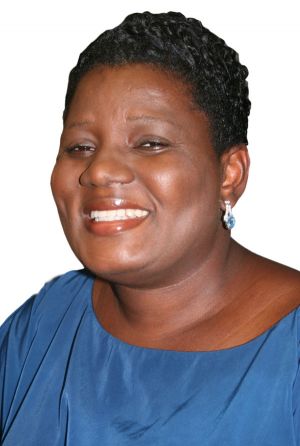
Monique Bate Akoachere, Ph.D., assistant professor of chemistry
Imagine stepping foot on U.S. soil for the first time and learning that everything you planned has changed. Before the first day of her new job, in a new country, Monique Bate Akoachere, Ph.D., watched as her new supervisor passed away from cancer. She hadn’t even been in the United States a week.
“I was here to work on my post-doctoral research,” explained Akoachere, the new assistant professor of chemistry at Saint Mary-of-the-Woods College (SMWC). “His project was halted and I had no idea what to expect.” Recognizing her talent, another supervisor snatched up Akoachere for research on the anthrax bacteria in Las Vegas, Nevada. “I was very happy to have another opportunity in the U.S.,” Akoachere said. “This anthrax project wasn’t a second-choice. This was right in line with my interests and experience.”
You’ll need a globe to chart Akoachere’s life adventure. Born and raised in Cameroon, Africa, she experienced Germany, Maryland, New York and Nevada before finally landing at The Woods. In Cameroon, Akoachere developed a love of teaching at an early age. “My students at the time were my younger siblings,” she said. “My father strongly encouraged and emphasized education.” Coming from a family with 10 children, there was always someone for Akoachere to teach.
Her love for science developed early, as well. In middle school her teachers noticed that she not only excelled in science and math, but that she also had a knack for helping others grasp challenging material. Teaching, particularly in the sciences, seemed inevitable. She earned her bachelor’s in biology and master’s in biochemistry at Cameroon’s University of Buea, before receiving a doctorate in biochemistry at the University of Giessen in Germany. While writing nearly a dozen publications and teaching advanced courses, she also studied some of the world’s deadliest diseases, namely malaria and anthrax.
All great discoveries start from simply questioning the world around us. For Akoachere, the question began as, “How do we stop malaria?” Over the years, malaria, a mosquito-borne infectious disease that plagues tropical regions like Africa, has adapted to many of the drugs used for treatment. “Chloroquine, a common treatment for malaria, is a cheap drug that most Africans can afford,” Akoachere said. “Unfortunately, the malaria parasite has become resistant to this drug, which is a serious problem.” Her research exposed the malaria parasite to its own toxins. “In other words,” she said, “the parasite killed itself.” This led to a more resistant treatment, based on combining two different malaria drugs.
Akoachere conducted similar research with anthrax. “If anthrax doesn’t germinate, it cannot produce toxins,” Akoachere explained. “We identified two important factors needed for germination and then counteracted them.” Since anthrax can lie dormant for years, understanding ways to prevent the bacteria from germinating is an essential element for countering bio-terrorism.
After about five years of research and teaching in Nevada, Akoachere was ready to use her experience to elevate students to the next level. That’s when she found The Woods. “Monique brings extraordinary biochemical experience from across the globe,” said Janet Clark, Ph.D., SMWC’s vice president for academic affairs. “She has been at the forefront of drug development research for years. She also has a uniquely challenging and compassionate touch to teaching. She encourages students to pursue their own interests, question everything and think critically about the world around them.”
Akoachere believes her research experience makes her a better teacher. “Students learn from what we do and how we do it,” she said. “A good teacher should have sound experience and command over the concepts, as well as a broad knowledge beyond the realms of the particular course being taught.”
Sitting down in her office, it’s hard to believe she has only been at The Woods for about a month. Warm, colorful and cozy, it is the kind of place students can come to when they need to get advice, release some steam or simply unwind. This kind of nurturing environment, a hallmark of The Woods, is key to student success. “The power a woman has when she is educated is immeasurable,” Akoachere said. “We need to encourage girls to set their sights on high goals and support their achievement.”
Akoachere believes that chemistry can stick with students longer when the subject relates to their everyday lives. Using all forms of multimedia, she believes that a stimulated student is an engaged student. Her personal teaching philosophy encourages students to ask questions, pursue their own interests and freely express themselves. She sees herself as a facilitator between their abilities and their potential.
“Hiring a well-respected female biochemist as a professor at The Woods was an easy decision,” Clark said. “Our campus students interested in careers in science will have an incredibly talented and confident mentor in Monique. She provides the proof that women can excel in science careers, while also making a difference in the lives of others.”